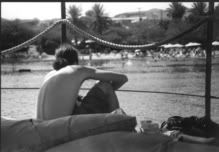Questions from the audience #1

To give this blog some more structure, not only physical but also in my mind.
To play with my statistics, that I adore so much.
To have fun.
To loosen this blog's iron rule.
What I will do is try and give straight-forward answers on queries that people have entered in Google. By complete chance my weblog has been chosen by this people and being able to view the queries I know my blog could not provide answers. And in the end Google is about answers.
A good friend of mine, Niek, has told me he considered blogs to be "internet-pollution". My answer to him was: Does it take up so much space that internet is unusable. He said: No, but people can't even see this space because of weblogs...
So here goes:
29th August 2005 03:19:52
From: New Jersey, Cherry Hill, United States
Query: how did the Italian city-states contribute to modern diplomacy?
Well, they did contribute many of the important rituals, they contributed most of the terms and language. They contributed this because of their supposedly cultural superiority that was discovered by the French and the Spanish government once diplomacy became more and more complicated. It had become more complicated because Europe's competition started getting more and more players with more and different interests.
Then again, the Italian-city states had engaged in difficult, complex and ritualistic diplomacy when they began trading intensely with Mamluk Egypt and in the Ottoman Empire. They also has lots of diplomatic experience because of the many conflicts that arose between themselves. For they were Europe's window on the world.
I guess this makes "modern diplomacy" hard to define. Well. Good. It is a strange concept to call something modern before the industrial revolution and the consciousness of this revolution had entered Europe.
Here is diplomacy's most beloved experiment:



 It was after the Gulf War that his mother and boyfriend at the time decided to 'descend' from the Holy land and set sail towards The Hague, being the birthplace of Even-Zohars
mother. Jonathan managed well in Grade school and High school, so the
next logical step was the University, the infinite source of knowledge.
After speculating on Industrial Design, Social Geography and Journalism
it was the study of History at Leiden that turned out to be his
decision.
It was after the Gulf War that his mother and boyfriend at the time decided to 'descend' from the Holy land and set sail towards The Hague, being the birthplace of Even-Zohars
mother. Jonathan managed well in Grade school and High school, so the
next logical step was the University, the infinite source of knowledge.
After speculating on Industrial Design, Social Geography and Journalism
it was the study of History at Leiden that turned out to be his
decision.
 Now, four years into the study, matters have only become more
complicated as this student advances towards World History; meaning the
complete array of fields a historian may implement in explaining the
entire past of the entire world to fellow men. It is especially the
philosophical character of World History that attracted Jonathan.
Now, four years into the study, matters have only become more
complicated as this student advances towards World History; meaning the
complete array of fields a historian may implement in explaining the
entire past of the entire world to fellow men. It is especially the
philosophical character of World History that attracted Jonathan.
 For him there is only one question that stands above all others like a
lonely chuchtower in some Flemish village, which asks the cause of the
Western Rise and the Industrial Revolution. Furthermore, the role of the
European self- and worldimage throughout its history may explain the
role of Europe in the Eurasian Human Web. Thus, the direct contact
between Islam and Christianity is to be investigated. Were Muslims
constantly on the verge of invading Europe? How did Arab people perceive
the 'barbaric' Christians? How was Science spread and how did the West
pick up knowledge form the Arabs or from further East? Europe and the
Islam are still not at peace, certainly not in the mind.
For him there is only one question that stands above all others like a
lonely chuchtower in some Flemish village, which asks the cause of the
Western Rise and the Industrial Revolution. Furthermore, the role of the
European self- and worldimage throughout its history may explain the
role of Europe in the Eurasian Human Web. Thus, the direct contact
between Islam and Christianity is to be investigated. Were Muslims
constantly on the verge of invading Europe? How did Arab people perceive
the 'barbaric' Christians? How was Science spread and how did the West
pick up knowledge form the Arabs or from further East? Europe and the
Islam are still not at peace, certainly not in the mind.
0 Comments:
Post a Comment
<< Home